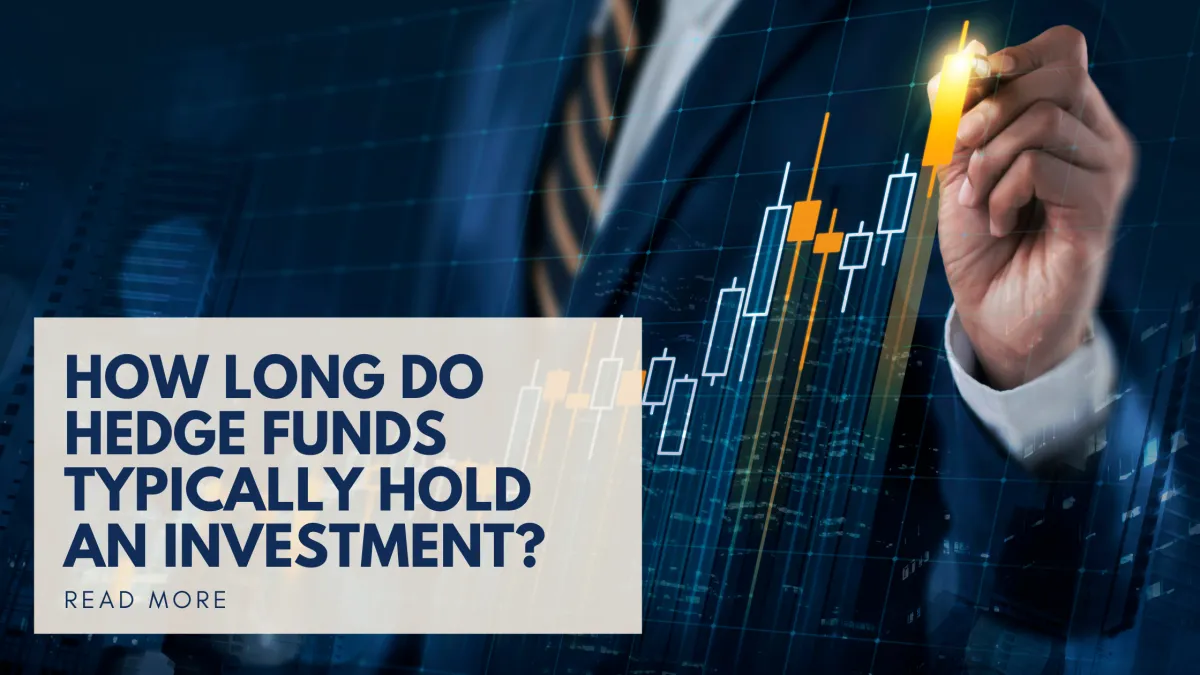Hedge Fund Buyer Blogs

How Long Do Hedge Funds Typically Hold An Investment?
Introduction
Hedge funds, renowned for their sophisticated and often unconventional investment strategies, operate with one primary aim: to deliver the highest possible return for their investors. A key aspect that distinguishes hedge funds from traditional investment funds is the latitude they have in their investment choices, which allows them greater flexibility in terms of holding periods for investments. But, how long do hedge funds typically hold an investment? To comprehend this, one must delve into the intricacies of the hedge fund world.

The Diversity of Hedge Fund Strategies:
Hedge funds are investment vehicles that employ a wide variety of strategies to generate returns for their investors. These strategies can range from long-only equity investments to complex derivatives trading and everything in between. Each strategy has its own unique characteristics and objectives, which in turn influence the holding period of the investments made by the hedge fund.
The holding period refers to the length of time that a hedge fund retains an investment before selling it. It is an important consideration for both the fund manager and the investors, as it can have a significant impact on the overall performance and profitability of the fund.
The duration for which a hedge fund holds onto an investment is primarily determined by the specific strategy being employed. For example, a hedge fund that focuses on long-term value investing may hold onto its investments for several years, patiently waiting for the market to recognize the underlying value of the assets. On the other hand, a hedge fund that engages in high-frequency trading may hold onto its investments for only a matter of seconds or minutes, taking advantage of short-term price fluctuations.
Other factors that can influence the holding period include market conditions, economic outlook, and the fund manager's investment thesis. In times of market volatility or uncertainty, hedge funds may choose to hold onto their investments for longer periods to ride out the turbulence and potentially capture greater returns. Conversely, in a rapidly changing market environment, hedge funds may adopt a more active trading approach, frequently buying and selling investments to capitalize on short-term opportunities.
It is worth noting that the holding period can also be influenced by external factors such as regulatory requirements or investor preferences. Some hedge funds may have specific mandates or restrictions that dictate the minimum or maximum duration for which they can hold onto investments. Additionally, certain investors may have their own preferences regarding the holding period, such as a desire for more frequent portfolio turnover or a longer-term investment horizon.
In conclusion, the holding period of a hedge fund is not a one-size-fits-all concept. It varies greatly depending on the specific strategy employed, market conditions, economic outlook, and other factors. Understanding the typical holding period for a hedge fund requires a deep understanding of its investment strategy and the factors that influence its decision-making process.
Equity Long/Short: This is perhaps the most traditional of hedge fund strategies. Managers take long positions in stocks they believe will appreciate and short positions in stocks they believe will decline. Holding periods in this strategy can vary from a few days to several years, depending on the fund's investment thesis.
Event-Driven: Funds using this strategy aim to capitalize on large corporate events such as mergers, acquisitions, or bankruptcies. The holding period often hinges on the timeline of the corporate event in question.
Macro: These funds invest in instruments like bonds, currencies, and commodities based on macroeconomic principles. Given the global scale of the factors considered, these investments might be held from anywhere between a few months to a couple of years.
Quantitative: Some hedge funds use complex mathematical models and algorithms to determine their trades. The holding period for such quantitative strategies can vary from microseconds in high-frequency trading to more extended periods in strategies like statistical arbitrage.
Distressed Debt: Funds focusing on this strategy buy the bonds of companies near or in bankruptcy. They typically have a longer-term view, holding onto the investment until the company recovers or the assets are liquidated.
Global Asset Allocation: Funds with this strategy allocate their assets around the world based on perceived opportunities. Depending on geopolitical and macroeconomic conditions, the holding period could range from a few months to several years.
Factors Influencing Holding Period:
Investment Thesis Duration: The basis for making an investment often comes with an expected timeline. If a fund invests in a stock, believing it will appreciate due to a product launch, the holding period might be determined by the timeline leading up to and following that launch.
Market Volatility: High market volatility can lead to shorter holding periods, especially if the fund is using technical analysis or aiming to capitalize on short-term market movements.
Liquidity Needs: Hedge funds might be forced to sell positions to meet redemption requests from investors or maintain adequate liquidity, influencing their holding periods.
Risk Management: To manage and control exposure to various sectors or asset classes, a hedge fund might adjust its portfolio periodically, which in turn affects the duration an investment is held.
The Evolution of Holding Periods:
In the past, hedge funds were known for their patient and long-term investment strategies. These funds would carefully select investments and hold onto them for extended periods, sometimes even for several months or years. This approach allowed hedge funds to take advantage of market trends and patiently wait for their investments to generate substantial returns.
Technological advancements and the emergence of quantitative and algorithmic trading have revolutionized the way hedge funds operate. These advancements have provided hedge funds with access to vast amounts of data and sophisticated trading algorithms that can analyze and execute trades at lightning speed.
As a result, the average holding period for hedge funds has generally shortened. With the ability to process large volumes of data and execute trades in milliseconds, hedge funds can now take advantage of short-term market fluctuations and capitalize on quick profit opportunities. This shift towards shorter holding periods has been driven by the desire to maximize returns in a fast-paced and highly competitive market environment.
The rise of quantitative and algorithmic trading has also contributed to the shorter holding periods. These trading strategies rely on complex mathematical models and algorithms to identify patterns and execute trades automatically. By leveraging these strategies, hedge funds can quickly react to market movements and adjust their positions accordingly, often within a matter of days or even hours.
Furthermore, the increased availability of real-time market data and advanced trading platforms has facilitated the adoption of shorter holding periods. Hedge funds can now monitor market conditions in real-time, allowing them to make informed decisions and react swiftly to changing market dynamics. This ability to stay nimble and adapt to market conditions has become crucial in the fast-paced and highly volatile financial markets.
While the shift towards shorter holding periods has become more prevalent in the hedge fund industry, it is important to note that not all hedge funds have abandoned longer-term investment strategies. Some funds still maintain a more patient approach, focusing on fundamental analysis and investing in companies with strong long-term growth prospects. These funds believe that taking a longer-term view allows them to capture the full potential of their investments and avoid being swayed by short-term market noise.
The average holding period for hedge funds has generally shortened due to technological advancements, the rise of quantitative and algorithmic trading, and the desire to maximize returns in a fast-paced market environment. However, it is essential to recognize that there is still a diversity of investment strategies within the hedge fund industry, with some funds continuing to embrace longer-term investment horizons.
A study by Barclays Capital noted that the average holding period for equity-focused hedge funds in the 1990s was around 12 months. By the 2010s, this had reduced significantly, with some estimates suggesting the average had dropped to less than 20 days for some funds, especially those using high-frequency trading strategies.
The Impact on Investors:
The holding period of a hedge fund can have implications for its investors:
Tax Implications: In some jurisdictions, long-term investments are taxed at a lower rate than short-term trades. Thus, the holding period can have a direct impact on after-tax returns for investors.
Fees: The shorter the holding period, the higher the transaction costs might be to increased trading frequency. This can erode returns, especially if the fund's performance doesn't significantly outperform its benchmark.
Transparency: Investors might find it challenging to understand a fund's strategy if it has a very short average holding period, making due diligence a bit more complex.
Risk: Shorter holding periods, especially in strategies like high-frequency trading, can introduce specific risks, including technological risks and the dangers associated with rapid market movements.
Conclusion:
The question of how long hedge funds typically hold an investment doesn't have a one-size-fits-all answer. Given the myriad strategies hedge funds employ, holding periods can vary widely, ranging from a fraction of a second to several years.
Investors considering hedge funds should not just look at potential returns but also understand the strategy being employed and its associated risks. A fund's average holding period can give insights into its approach to investing, its risk profile, and the kind of costs it might incur, all of which are crucial factors when making an investment decision.
In the ever-evolving world of hedge funds, flexibility remains the cornerstone. As market conditions, technological advances, and global scenarios change, it's likely that holding periods will continue to adapt in response, making it all the more essential for investors to stay informed and agile.
Top Hedge Funds

Get Hedge Fund List
Search Blog
Year
Month

Get In touch

Hedge Fund Buyer
(803) 310-7106
100 Old Cherokee Rd